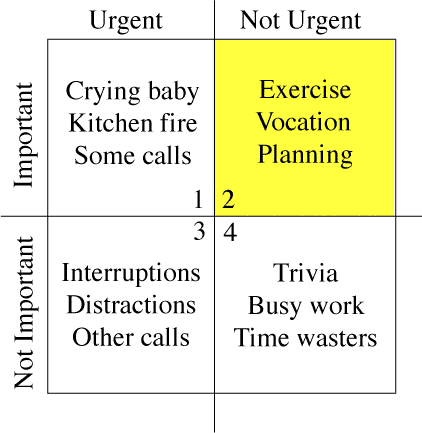Time Management Skills

Time Management Skills– Frequently Asked Questions
- What is Time Management?
- What is the Attention Management Challange?
- What is the main purpose of Time Management?
- What is effective Time Management?
- What are some Time Management skills and techniques?
- Why is Time Management important?
- What are some Time Management strategies?
- What are some good Time Management tools?
- What is the importance of Time Management in the workplace?
- What is the importance of Time Management for students?
- The Art of Saying No?
What is Time Management?
Time Management is the process of planning and controlling the time spent on specific activities to increase effectiveness, efficiency, and productivity.
Time Management involves the process of optimizing the demands relating to work, social life, family, hobbies, personal interests and commitments with the finiteness of time. Using time effectively is the active management of activities to meet predefined goals and objectives.
The goal to maximize the overall benefit within the same allotted time we all have in common. Time itself cannot be managed because it is fixed. Time management can be aided by a range of skills, tools, and techniques used to manage time to accomplish required tasks, projects, and goals within defined time limits.
“The key is in not spending time, but in investing it.”
– Stephen R. Covey
What are the key elements of Time Management?
1) Creating an environment for effective Time Management
Time-management effectiveness requires the creation of an environment conducive to “real” effectiveness. These strategies include principles such as:
- Prioritize Task List: Creating a list of required paperwork, administration, and tasks and then prioritize the list.
- Preserve your Time: Protect and secure time by insulation, isolation, and delegation.
- Goal Management: The process of archiving goal-focused motivation.
- Momentum: Respond to bad time-habits such as procrastination, by focusing on smaller steps to build momentum.
2) The Setting of Priorities and Goals
Time Management effectiveness requires the establishment of personal goals. These goals need to be recorded and broken down into a project, an action plan, or a simple task list.
For these tasks, an importance rating needs to be established and priorities assigned. This can be done using various techniques. One of the simplest tools is to evaluate using the criteria important/unimportant and urgent/not urgent, and then place the task into quadrants in the following matrix.

Important/Unimportant and Urgent/Not urgent Matrix
- Important/Urgent: Quadrant 1 Tasks: These tasks are done immediately and examples include crises, urgent deadlines, critical problems.
- Important/Not Urgent Quadrant 2 Tasks: These Tasks get an end date and examples include relationships, planning, health.
- Unimportant/Urgent Quadrant 3 Tasks: These Tasks are delegated and examples include unplanned interruptions calls and meetings.
- Unimportant/Not Urgent Quadrant 4 Tasks: These Tasks are dropped and examples include social media surfing, surveys, trivia.
3) Elimination of Non-Priorities
Time Management requires the elimination of tasks or activities that do not add value. Using the important/unimportant and urgent/not urgent matrix can help identify the Non-Priorities Tasks. However, change is hard and daily life patterns are the most deeply ingrained habits of all.
Factors that affect time management are habits, lack of goal clarity, not deligating effectively, not out-sourcing effectively, and guilt to name just a few. To eliminate non-priorities postpone unimportant tasks and use creativity to neutralize wasted time in traffic, for example, by listening to audiobooks.
Many high achievers list their ability to say “No” to Non-Priorities as one of their key strengths and a reason for their success.
4) Implementation of Goals
A task list or to-do list is a list of tasks to be completed. It is a tool to supplement our memory and to keep track. Task lists are used in self-management and can have the form of paper list or software checklists.
Goals are achieved when they are broken down into smaller achievable steps that can be easily started and finished to enable momentum to build. Momentum in achieving small goals provides motivation and confidence towards the completion of larger goals that may seem insurmountable.
“It’s not enough to be busy, so are the ants. The question is, what are we busy about?”
– Henry David Thoreau
What is Project Management?
Project Management is the structured methodology of initiating, planning, executing, controlling, and delivering the work of a team to achieve specific goals and meet specific success criteria within a specified time. Project Management’s objectives are to achieve all of the project goals within the given resource constraints.
The primary constraints that Project Management seeks to optimize are scope, time, quality and budget. The challenge is to optimize the allocation of resources and apply them to meet defined objectives.
What is the Attention Management Challange?
Attention management refers to techniques for managing attention in an era of the vast availability of information and sources of distraction. Attention is becoming a scarce resource as human beings are overwhelmed with the information.
Attention management will become an increasingly important skill for the 21st century. With the digital revolution and the plethora of communication devices, time management is no longer enough to guarantee a good quality of work. Allocating time to perform one activity is no longer sufficient if constant interruptions cause reduced efficiency and effectiveness.
As this attention challenge increases, the focus of time management needs to expand to encompass attention management. The ability to control distractions and stay focused is essential to produce higher quality results.
Time Management Skills FAQs to be covered with our Next Instalment
- What are some Time Management skills and techniques?
- Why is Time Management important?
- What are some Time Management strategies?
- What are some good Time Management tools?
- What is the importance of Time Management in the workplace?
- What is the importance of Time Management for student?
- The Art of Saying No?
“He who know most grieves most for wasted time.”
– Dante
Share this Information to increase Your Influence
Share this page with your network to increase your Influence. Then explore the additional Coaching Information from some of the world’s top experts. Click the links below:
“Until you value yourself, you will not value your time. Until you value your time, you will not do anything with it.”
– M. Scott Peck
What are the Best Quotes About Time Management?
“Make use of time, let not advantage slip.” – William Shakespeare
“Time is the wisest counselor of all.” – Pericles
“Time is what we want most, but what we use worst.” – William Penn
“Dost thou love life? Then do not squander time, for that is the stuff life is made of.” – Benjamin Franklin
“Your future is created by what you do today, not tomorrow.” – Anonymous
“The best thing about the future is that it comes one day at a time.” – Abraham Lincoln
“The common man is not concerned about the passage of time, the man of talent is driven by it.” – Shoppenhauer
“A person who dares to waste one hour of life has not discovered the value of life.” – Charles Darwin
“Concentrate all your thoughts upon the work at hand. The sun’s rays do not burn until brought to a focus.” – Alexander Graham Bell
“What may be done at any time will be done at no time.” – Scottish Proverb
“By failing to prepare, you are preparing to fail.” – Benjamin Franklin
“It’s not that I’m so smart, it’s just that I stay with problems longer.” – Albert Einstein
“The shorter way to do many things is to only do one thing at a time.” – Mozart
“Those who every morning plans the transactions of that day and follows that plan carries a thread that will guide him through the labyrinth of the busiest life.” – Victor Hugo
“The best thing about the future is that it comes one day at a time.”
– Abraham Lincoln
Books about Time Management
- Getting Things Done, by David Allen, 2001
- Eat That Frog!: 21 Great Ways to Stop Procrastinating and Get More Done in Less Time, by Brian Tracy, 2001
- The 4-Hour Workweek, by Tim Ferriss, 2007
- Essentialism: The Disciplined Pursuit of Less, by Greg McKeown, 2011
- Deep Work, by Cal Newport, 2016
- Off the Clock: Feel Less Busy While Getting More Done, by Laura Vanderkam, 2018
- Manage Your Day‑To‑Day: Build Your Routine, Find Your Focus, and Sharpen Your Creative Mind, by Jocelyn K. Glei, 2013
- The Now Habit, by Neil Fiore, 1988
- The Time Trap: The Classic Book on Time Management, by Pat Nickerson and R. Alec MacKenzie, 2009
- The 80/20 Principle, by Richard Koch, 1997
- Time Management, by Brian Tracy, 2006
- The Getting Things Done Workbook: 10 Moves to Stress-Free Productivity, by David Allen, 2019
- The ONE Thing, by Gary W. Keller and Jay Papasan, 2012
- The Productivity Project: Accomplishing More by Managing Your Time, Attention, and Energy Better, by Chris Bailey, 2016
- Deep Work, by Cal Newport, 2016
- The Checklist Manifesto, by Atul Gawande, 2009
- 168 Hours: You Have More Time Than You Think, by Laura Vanderkam, 2010
- Time Management from the Inside Out: The Foolproof Plan for Taking Control of Your Schedule — and Your Life, by Julie Morgenstern, 2000
- 18 Minutes: Find Your Focus, Master Distraction, and Get the Right Things Done, by Peter Bregman, 2011
- When: The Scientific Secrets of Perfect Timing, by Daniel H. Pink, 2018
- First Things First, Book by Stephen Covey, 1994
- Organize Tomorrow Today: 8 Ways to Retrain Your Mind to Optimize Performance at Work and in Life, by Jason Selk, Matthew Rudy, and Tom Bartow, 2015
- Make Time: How to Focus on What Matters Every Day, by Jake Knapp and John Zeratsky, 2018
- The Dip, by Seth Godin, 2007
- Scrum: The Art of Doing Twice the Work in Half the Time, by Jeff Sutherland, 2014
- Do It Tomorrow and Other Secrets of Time Management, by Mark Forster, 2008
- Cluttered Mess to Organized Success Workbook: Declutter and Organize your Home and Life with over 100 Checklists and Worksheets, by Cassandra Aarssen, 2018
- How to Be a Productivity Ninja: Worry Less, Achieve More and Love What You Do, by Graham Allcott, 2013
- Free to Focus: A Total Productivity System to Achieve More by Doing Less, by Michael Hyatt, 2019
- Smarter Faster Better: The Secrets of Being Productive in Life and Business, by Charles Duhigg, 2016
“You may delay, but time will not.”
– Benjamin Franklin
Videos about Time Management
How To Multiply Your Time – Rory Vaden – TEDxDouglasville
This Is How Successful People Manage Their Time
Image Credit: 1) NasimAhmed96$ [CC BY-SA 4.0 (https://creativecommons.org/licenses/by-sa/4.0)] 2) Rorybowman [Public domain]










You must be logged in to post a comment.